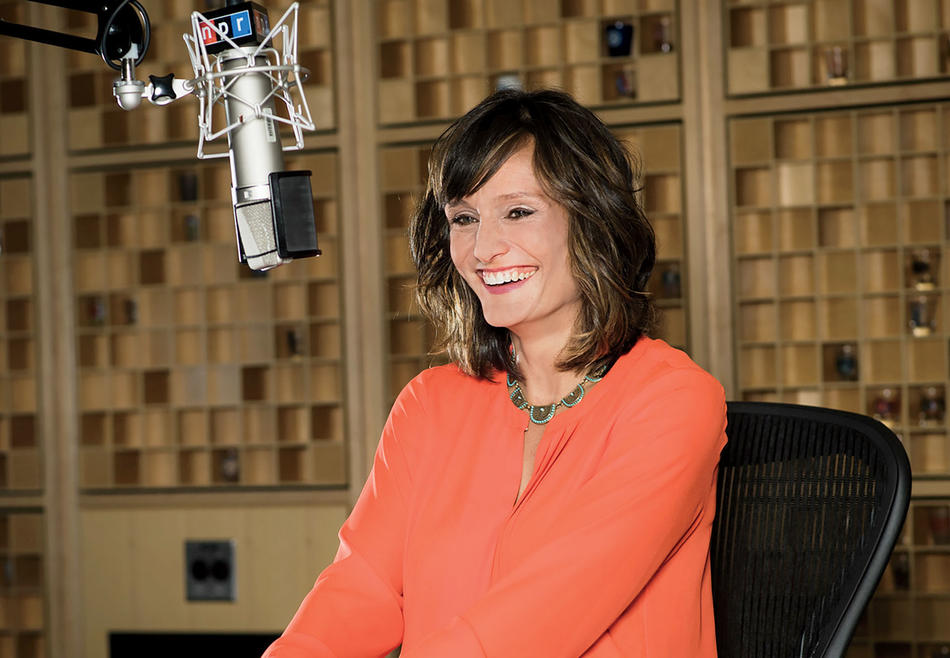At about 3:30 a.m. most weekday mornings, Rachel Martin ’04SIPA heads to the guest bedroom in the basement of her Washington, DC, home, where the windows are stuffed with pillows for soundproofing and an assortment of tech equipment links her makeshift studio to National Public Radio’s nearby headquarters. Martin has been cohosting Morning Edition — the nation’s most-listened-to radio news program — from home since the coronavirus pandemic started. And like many other parents, once Martin signs off, she has to transition seamlessly into her second job: tag-teaming with her husband to homeschool their first- and third-grade boys. “It’s like living in an endless loop,” Martin says. “There is no sense of place, so distinctions like ‘work’ and ‘home’ don’t matter.”
In the fourteen years that she has spent on air at NPR, Martin has become known for her incisive interviews, especially with world leaders, from Hillary Clinton to Hamid Karzai. “I like the challenge of drawing someone out and holding them accountable in real time,” she says. Martin credits studying international affairs at SIPA, with an independent concentration in media and democracy, with preparing her for these conversations, and she says that she still refers to an international-law book from graduate school when she needs to distill legal frameworks, such as those related to the targeted killing of Iranian general Qasem Soleimani in 2020. “It has had a very practical influence on my job: understanding the laws of war, just wars, unjust wars, details of the Geneva Conventions,” Martin says.
Broadcast journalism was an early ambition for the Idaho native, who started her career as an intern at San Francisco’s KQED-FM. But when Martin applied to SIPA shortly after 9/11, she planned to eventually work for the US State Department or United Nations. “I felt very called to foreign policy … how different nations and cultures interact to hopefully build a more peaceful world,” Martin says. She interned at the UN while studying at Columbia but ultimately decided that working for a monolithic institution felt limiting. “I wanted to be out in the world more, more connected to foreign policy,” she says.
After a class on Afghanistan sparked her interest in the region, Martin decided to travel to Kabul. She spent the summer between her first and second years at SIPA reporting for Public Radio International on children living under the Taliban. “My parents were totally freaked out. It was an active war zone,” she recalls. “But I’d met and befriended people at Columbia who had lived and worked there. It made it seem possible to go.” The stint sealed her commitment to journalism.
Within months of graduating, Martin returned to Afghanistan as a stringer for NPR. That led to her long career with the storied nonprofit media organization, including roles as a religion correspondent, foreign correspondent, and national-security correspondent. Before becoming a host of Morning Edition, in December 2016, she spent four years anchoring Weekend Edition Sunday.
For Martin, the focus on COVID-19 has been a departure but also an opportunity to explore. Hoping to capture this moment, she conceived of “Learning Curve,” a series that dissects the daily struggles of parents and teachers during the pandemic. Martin interviews mothers of varied economic and racial backgrounds across the country, checking in with them periodically throughout the school year: a Tennessee mother who resigned from her teaching job to keep her nine-year-old immunocompromised son safe, a California teacher with five school-age children of her own, a North Carolina grocery-store clerk who is also a single mother of four.
Radio has always been Martin’s favored news medium. “I like the performative aspect of it. I like using my voice,” she says. Plus, Martin says that radio cultivates connection in a unique way. “There’s a trust in conversation, I think, and an intimacy on radio,” she says. “I brandish a microphone, and people tell me their innermost thoughts and views, even if they’re controversial. People stop thinking about the mic and say what they mean.”
This article appears in the Winter 2020-21 print issue of Columbia Magazine with the title "Early Riser."



